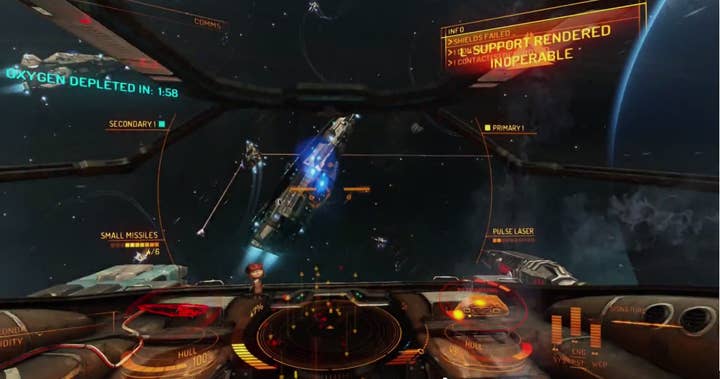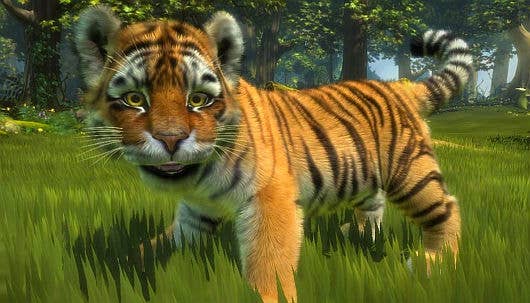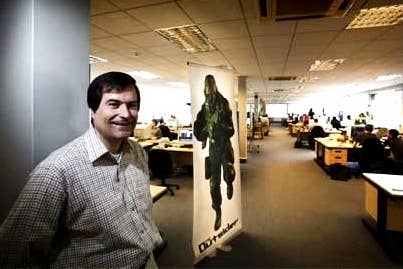Braben: "A lot of confidence and a little bit of cash"
Frontier has just signed a publishing deal for two new titles, but how key was its Game Of The Week process?
Frontier Developments is busy making Elite: Dangerous right now, but it's also just announced a new publishing deal for two unnamed titles. The new games will use the studio's Cobra technology and were both products of a Game Of The Week process, which allows members of staff to pitch their ideas.
Here David Braben, Frontier boss, explains why that process is still so important to the company, why the indie scene is like '70s rock and how you get a studio to its twentieth anniversary and still maintain a lustrous head of hair.
Our Game Of The Week process, which is what it came out of, has run for a quite a long time now. The first game that came out of it was Lost Winds and I think that created quite a buzz within the company, and it also validated the process. So we've been running Game Of The Week, but actually the opportunity to do games on our own ticket… in a good way we've been in really high demand because people have wanted to work with us. Kinectimals, Disneyland Adventures, Zoo Tycoon, and obviously doing Elite at the same time.
"You've got to have quite a lot of confidence and a little bit of cash behind you to be able to do this kind of thing"
The Game Of The Week process is fantastic, we have an internal forum where people suggest ideas and other people essentially either shout them down or praise them. And it's quite clear that some ideas get a lot of traction quite quickly, they capture people's imaginations. And we've been looking at them in a very practical way, of the ideas that are good we've got various filters - is it a game that is novel in the marketplace? Is it a game that there's a big market for? So if you do a game for a platform which is not necessarily very popular, and for an audience that isn't very much on that platform clearly it's not going to do very well.
We've had our own forecasting system internally where we've been forecasting just about everybody's games for a long time and it's been very successful for us because we forecast our own games as well but it's very easy to want to try and put a tilt on them. But if you systematise it that's a good way forward. If you add to that the energy behind people saying 'oh this is a great idea, I'd like to work on it…' one of the things which is good is to work on a game that you really care about and this is a very good way of filtering for those kind of ideas.
So what we did is we have a top few games and it's quite clear which ones bubble to the top and clearly the ones that we've chosen to go ahead with are at the top of that list. The games are all different styles as well so obviously there's been an element of involving a partner on that, which games are most suited to the platforms we want to target?
I think it's really important for all of us. What are the conversations you have over lunch, over coffee? What do people really care about? I suppose part of it is why do people want to work at a company like Frontier, and not a giant company like Electronic Arts or Microsoft. It's wanting to have that input, that indie feel where there is real likelihood that a game idea, if it's good enough, and by good enough I mean judged by your peers as being good enough, then there's a good chance that it will get made.
On a really small start-up you get it implicitly because if there are just two or three people you will make the ideas that those two or three people want to make because that's all there is. That's how these companies move forward. But actually in practice these small start-ups tend to end up working on work for hire because that's the one that brings in the money. You've got to have quite a lot of confidence and a little bit of cash behind you to be able to do this kind of thing. You've got to be able to work on the ideas before they ever generate money.

Having said that, yes, I think it's a very very good thing because it's a way of slightly dispassionately looking at what you're creating and saying 'is this really going to work?' Because some of the ideas that come through are really lovely ideas but they're so flipping impossible to play that actually they wouldn't necessarily do well in the market place. And then there are others that have that quirky addiction, I mean look at a game like Flappy Bird. Imagine a design document for that. It's so unbelievably simple and I think it was only one or two days work, I remember reading that somewhere. But it's strangely compelling.
It's coming up with a process to place that sort of thing alongside a truly huge adventure. Some of them would require really big teams to deliver, others require really quite small teams so we can also match the opportunities. If we can see in our planning coming up there's an availability for 20 people to work on something for four months we can fit that to that slot. And so actually it creates an immense amount of flexibility for us as well.
We're talking a hundred or more ideas here, we're not talking just a few.
No question. Some of those ideas came through when we did a game called Thrillville: Off The Rails which had 50-odd arcade games actually embedded within it - some of those came from people's own creativity within the company
It's all of the people themselves who are here and get involved. It's very easy to talk about this sort of thing, it's harder to deliver on it and it's taken a while for us to get to the sort of scale where we can do this. It's in order to, and hopefully has, kept the indie feel going. I think by many people's definitions we're a bit big to be counted as an indie, even though we are still an indie. I think it's the independent atmosphere that's important, the fact that we do do the things, and in fact more so than many indies because we're less hand to mouth. We can sensibly say 'actually this is a great idea, let's pursue it.'
And what's wonderful in the case of these two projects is actually they're a fantastic hybrid because we're working with an external partner.
"The very fact that something is trendy is often a bad sign in this sort of industry because it means you're following the crowd"
Well, the very fact that something is trendy is often a bad sign in this sort of industry because it means you're following the crowd. With a lot of these things being different from other people is a big advantage, not just in game design but in business model and approach.
The point is Frontier has been around now for more than 20 years and I've been doing this for more than 30 years. We've seen so many changes, but what we're always trying to be is in a place where we can take advantage of that change. Whether it's the move in 2008 to mobile, then the consolidation of the way console development is done, all these changes are really important and I think we've been on the leading edge of it. We've been at the right place at the right time but also we've been there and we've taken advantage of it.
There are changes in the way people get their content, I mean, how many games sold through various online stores actually don't sell very many? It's horrifying quite how many don't make a lot of money. It's how do you get your game to be seen? What we've managed to do is keep that visibility of our titles going where we have have had many millions of downloads for games that we've made.
The sad thing is that the life on an indie is much more typical to have that sort of issue than the stand out successes that we do see from time to time. The parallel is in the '70s and '80s with rock bands, for every Rolling Stones or Pink Floyd there were probably a hundred bands that you haven't heard of that spent ten or 15 years touring the pub circuit and then retired.

It's really because it takes someone in that team to move the company, or the band, into the public eye somehow and to keep it there. And going back to the sort of thing that we're doing, working with partners, is a good thing because it also means we can be in the early stages of hardware. With Microsoft we were a launch title on Kinect, we've been a launch title on Xbox One and that means we get early access to the hardware, we understand how it's being developed. And that gives us a big advantage and and a lot of coverage.
There's an element of luck in it, no question. It's not standing still, is the other thing. Every one of the 30 years I've been in this business there's been a dramatic change, every single year. Some more than one change in a year.
I think the key is trying to ride those changes and anticipate them rather than reacting to them after the event. Because they happen so quickly, and games development is not a quick process. You've got to be developing for where you think it will be when the game ships, not where it is now.

